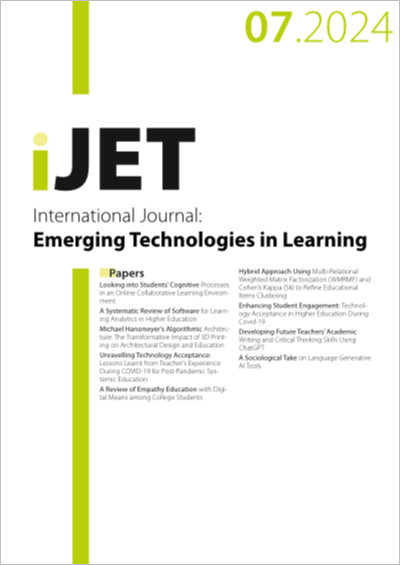Hybrid Approach Using Multi-Relational Weighted Matrix Factorization (WMRMF) and Cohen’s Kappa (Sk) to Refine Educational Items Clustering
DOI:
https://doi.org/10.3991/ijet.v19i07.50943Keywords:
Tasks - Skills Mapping; Matrix Factorization; Similarity measure; Learning con-tent; Educational items clustering;Abstract
In the context of adopting the competency-based approach (CBA) as a new teaching methodology in sub-Saharan countries, and particularly in Côte d’Ivoire, the development of learning content that is aligned with the economic, socio-cultural, and scientific needs of society is of paramount importance. Educational experts have therefore proposed competencies and associated tasks for educational programs. However, these learning contents often face issues of task redundancy. The present paper aims to address this problem by proposing a hybrid approach to educational item clustering, combining weighted multi-relational matrix factorization (WMRMF) and Cohen’s Kappa (Sk) techniques (Sk-WMRMF). This approach takes into account not only student performance and achievements but also a novel reflexive relationship, “tasks-require–tasks”. To evaluate the Sk-WMRMF approach, we conducted a survey among students in general secondary schools in Côte d’Ivoire. With an accepted task redundancy threshold of 0.185, an RMSE score of 0.198, and an improvement rate of 90.47% in the “tasks–skills” mapping, the results demonstrate that Sk-WMRMF enhances the elaboration of “task-skill” mappings. This not only improves learning content but also facilitates the updating of curricula in accordance with the CBA approach.
Downloads
Published
How to Cite
Issue
Section
License
Copyright (c) 2024 Denon Arthur Richmond GONO, Appoh KOUAME, Konan Marcellin BROU, Bi Tra GOORE

This work is licensed under a Creative Commons Attribution 4.0 International License.



